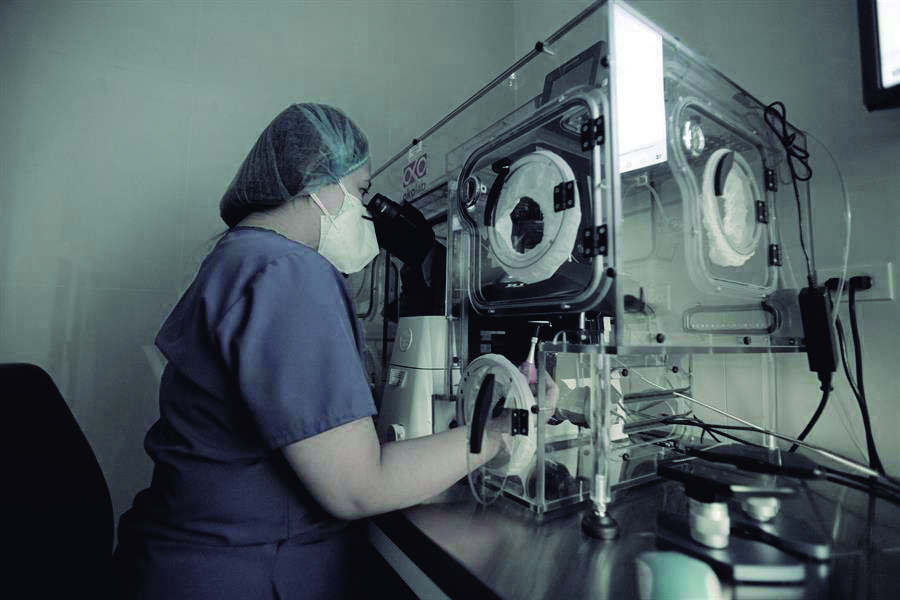
Panamá, 17 mar (EFE).- Una de cada seis parejas sufre de infertilidad en Panamá, que con unos 4,2 millones de habitantes es el país de Centroamérica que más tratamientos de reproducción asistida realiza, afirmó en una entrevista con Efe el doctor y especialista Mario Vega Croker.
En Panamá «ya la gente no se queda callada y se niega a no tener hijos», afirmó Vega Croker, que explicó que, más que un aumento en la incidencia de esta condición, lo que hay es un poco «más consciencia sobre el tema» en el país centroamericano.
El doctor Vega Croker es el director científico de Panama Fertility, la clínica de reproducción asistida responsable del «47 % de todos los nacimientos» producto de estas técnicas en Panamá, lo que supone que «uno de cada dos bebés vienen» de este centro.
El experto expuso que la Red Latinoamericana de Reproducción Asistida, la organización que recopila los datos de los centros más importantes de la región, indicó que «en el 2018 en Panama Fertility la tasa de embarazo en mujeres menores de 35 años se situó en el 78 %, que es altísimo, un 35 % por encima del resto del país».
Además, esta clínica mantienen una «tasa de embarazo gemelar del 6,8 %, un 55 % por debajo» del registro de otras instituciones en el país.
INFERTILIDAD, UNA ENFERMEDAD QUE SE TRATA TARDE
«Los pacientes suelen llegar muy tarde» a la consulta, alertó Vega Croker, pues los que «suelen acudir tienen una media de 38 años, con varios años intentándolo, vienen de otros centros, incluso internacionales, con ginecólogos, y no han logrado el embarazo».
«Por parte del paciente, tiene que haber más educación, y además el ginecólogo debe canalizar (el caso) a un profesional de fertilidad», valoró.
Vega Croker explicó que en Panamá aún «falta el acceso de los pacientes» a «los especialistas», incluso «a tratamientos, ya que hay países como España o Israel que están muy avanzados».
«Aquí deberíamos estar haciendo tres o cuatro veces más la cantidad de tratamientos» para la fertilidad, especificó.
El experto explicó que existen «cuatro métodos para conseguir la gestación: inducción de ovulación, inseminación artificial, fecundación invitro y la ovodonación», todos ellos disponibles en Panama Fertility.
También está «la congelación de óvulos», a lo que recurren «las mujeres jóvenes» que por razones diversas «no están listas para ser madres y quieren tener algún tipo de seguridad cuando sí quieran serlo. Se les hace extraer los óvulos, pero en vez de fecundarlos se congelan».
El especialista señaló que el método más «utilizado es la fecundación in vitro, porque es el que más alta tasas de éxito ofrece a una pareja utilizando sus propios óvulos».
Este tratamiento ha mejorado en los últimos años, pues «en el pasado, había hasta un 30 % de posibilidades» de tener gemelos, pues «muchos laboratorios al no contar con la calidad o tecnología para hacer crecer bien a un embrión lo que hacían era poner varios embriones dentro de la mujer».
«Ahora estos tratamientos son mejores, pues se intenta poner solo un embrión, solo en las mujeres jóvenes, se llama transferencia de embrión único», añadió.
Panamá Fertility, con 30 años de experiencia, tiene como director científico al doctor Vega Croker y como director médico al doctor Mario Vega Rich.
Infertility affects one in six couples in Panama
Panama, Mar 17 (EFE) – One in six couples suffers from infertility in Panama, which with some 4.2 million inhabitants is the Central American country that performs more assisted reproduction treatments, said in an interview with Efe the doctor and specialist Mario Vega Croker.
In Panama «people are no longer silent and refuse not to have children», said Vega Croker, who explained that, rather than an increase in the incidence of this condition, what there is is a little «more awareness on the subject» in the Central American country.
Dr. Vega Croker is the scientific director of Panama Fertility, the assisted reproduction clinic responsible for «47% of all the births» resulting from these techniques in Panama, which means that «one out of every two babies come» from this center.
The expert exposed that the Latin American Network of Assisted Reproduction, the organization that compiles data from the most important centers in the region, indicated that «in 2018 in Panama Fertility the pregnancy rate in women under 35 years of age stood at 78 %, which is very high, 35 % above the rest of the country».
In addition, this clinic maintains a «twin pregnancy rate of 6.8%, 55% below» the record of other institutions in the country.
INFERTILITY, A DISEASE THAT IS TREATED LATE
«Patients usually arrive very late» for consultation, warned Vega Croker, since those who «usually come are on average 38 years old, have been trying for several years, come from other centers, even international ones, with gynecologists, and have not achieved pregnancy».
«On the part of the patient, there must be more education, and also the gynecologist must channel (the case) to a fertility professional,» he said.
Vega Croker explained that in Panama there is still «a lack of access for patients» to «specialists», even «to treatments, since there are countries like Spain or Israel that are very advanced».
«Here we should be doing three or four times the amount of treatments» for fertility, he specified.
The expert explained that there are «four methods to achieve gestation: ovulation induction, artificial insemination, in vitro fertilization and ovodonation», all of them available at Panama Fertility.
There is also «egg freezing», which is used by «young women» who for various reasons «are not ready to become mothers and want to have some kind of security when they do want to become mothers. They have their eggs extracted, but instead of fertilizing them, they are frozen».
The specialist pointed out that the method most «used is in vitro fertilization, because it is the one that offers the highest success rate to a couple using their own eggs».
This treatment has improved in recent years, because «in the past, there was up to a 30% chance» of having twins, because «many laboratories, not having the quality or technology to make an embryo grow well, what they did was to place several embryos inside the woman».
«Now these treatments are better, because they try to place only one embryo, only in young women, it is called single embryo transfer», he added.
Panama Fertility, with 30 years of experience, has Dr. Vega Croker as scientific director and Dr. Mario Vega Rich as medical director.
